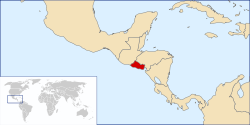Church And Salvadoran Government Broker Cease-fire Between Notorious Gangs – Analysis
By COHA
By Guest Scholar Gabriela Acosta with additional contributions from Research Associate Roman Suver
Rated as one of the most violent nations in the Americas, if not the world, El Salvador has faced an uncertain future as homicide rates have continued to rise over the last two decades, largely due to escalating warfare between enemy gangs. The Salvadoran government’s increased efforts to stamp out violence have had little effect on the nation’s homicide rate, which has almost doubled in less than a decade. In an attempt to halt the bloodshed, the local Catholic Church has been credited with recently forging a truce between Mara Salvatrucha (MS-13) and Barrio 18, two of the most violent and feared criminal gangs in the Western Hemisphere. The results have been drastic; El Salvador’s murder rate has dropped by more than 50 percent in the few weeks following the reports of a cease-fire, and for the first time in more than three years, the nation was murder-free for a full day this past Saturday, April 14.[1] Despite the incredible developments in the Central American nation, the Salvadoran government continues to vehemently deny any involvement in securing the agreement, as local factions allege that the cease-fire was brokered with bribery and a pledge from the state to improve prison conditions for jailed leaders from the two gangs.

Over the last eight years, murder rates in a nation of little over 6.1 million have grown from 36 to 70 per 100,000 individuals.[2] Until now, efforts to combat the violence have focused on a hardline approach, beginning with the implementation of the so-called “Plan Mano Dura” (Firm Hand) in 2003 under President Francisco Flores—a proactive initiative with aggressive military and police sweeps as the central strategy in an effort to suppress overt gang activities. Additional rehabilitation and youth education components were added to the initiative by President Antonio Saca, although these constituted a secondary focus, and the overall results of the past decade’s efforts have been atrocious. Instead of reducing violence, the massive government expenditures and resource allocation have actually precipitated a doubling in the murder rate, as is described in the aforementioned statistics.
It is purported that leaders from both street gangs approached notable members of the Roman Catholic Church to request assistance in achieving a truce between the two groups. On March 8th and 9th, the government assisted in the ceasefire by facilitating transfers of approximately 30 of the two gangs’ leaders from maximum security facilities in Zacatecoluca to lower-security institutions.[3] The move provided the gang bosses with greater access to fellow members and underlings, enabling them to relay communications regarding the existence of the treaty throughout their ranks. This had an immediate effect throughout El Salvador, quickly reducing the murder rate from 14 per day to as little as two in only a matter of weeks—the lowest homicide rate in over three years.[4]
Although it is widely recognized that some administrative cooperation has been necessary in ensuring that the prisoner transfer would be carried out, President Mauricio Funes nonetheless denies his government’s involvement in any discussions leading to a de facto agreement. In a press conference three weeks ago, he firmly stated that “the government did not sit down to negotiate with gangs,” yet he acknowledged that some of his colleagues may have “facilitated” the process.[5] Despite Funes’ tough-minded denials, an intelligence report compiled in February asserts that prominent government officials “offered, if it is necessary, to make deals or negotiate with subjects who have power inside organized crime structures to reduce homicides.”[6]
In his own strategic approach to implementing a long-term solution to gang activity and violence in El Salvador, Funes has hinted at creating a collaborative commission of Salvadoran community leaders, members of the Church, private-sector leaders, and political figures that would explore various options for combating local gangs. A central strategy in this effort, as proposed by Funes, would be based largely on economic mechanisms similar to the approach currently undertaken in Brazil. Under closer inspection, however, these market solutions appear to be fundamentally based on bribes—a move towards corrupt practices and economic appeasement of criminal factions, which if overtly implemented, would be certain to undermine the government’s integrity both domestically and internationally. Sources claim that the government had offered gang bosses of both MS-13 and Barrio 18 a reward of $10,000 USD along with better housing conditions for the transferred jailed leaders if the gangs agreed to comply with the terms of the negotiated truce.[7] The Church, however, maintains that the truce was mediated in good faith, and without any conditions or contingencies whatsoever.[8]
Provided that the allegations of government involvement in the mediation of the truce and in the bribery of abhorrently violent criminal gangs proves to be true, the Funes administration could be setting a dangerous precedent. If the federal executive allows its perceived success in governance and overall public esteem to become dependent on keeping the homicide rate down, it could easily be manipulated into providing a payoff to murderous gangs whenever elections draw near. The “optics” of appeasing and rewarding the terrorizing street gangs that in one form or another affect most Salvadorans’ lives, however, are also very damaging to the government’s popularity and public support, and this has forced the Funes administration to act. Regardless of how true the notions of government-gang bribery are, the allegations have provoked a flurry of threats directed towards investigative journalists—particularly ones from the daily newspaper El Faro, the first source to report on the truce. Reporters have been tracked, harassed with threatening messages, and denounced by Salvadoran government authorities. In response to the assaults, El Faro editor, Carlos Dada, said, “The government is under intense pressure to reduce crime rates, and the strain is showing.”[9]
To view sources click here.
